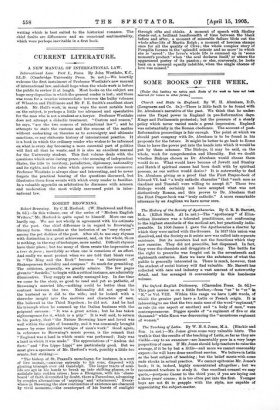SOME BOOKS OF THE WEEK.
[Under this heading we notice smolt Books of the look ess have not boos reserved for review in other forme.) Church and State in England. By W. H. Abraham, D.D. (Longmams and Co. 6s.)—There is little fault to be found with Dr. Abraham's narrative of the past. We think that he under- rates the Papal power in England in pre-Reformation days. Kings and Parliaments protested; but the pressure of a steady policy which never varied made a great impression. England was substantially in the Roman obedience. The account of post- Reformation proceedings is fair enough. The point at which we should part company with Dr. Abraham is to be found in his proposals for the future. It might be better to go back to Rome than to have the power put into the hands into which it would be put by these schemes. The Bishops, it may be said, on the whole, work for comprehension and liberality. But we doubt whether Bishops chosen as Dr. Abraham would choose them would do so. What would have become of Jowett and Stanley and Hatch if spiritual causes had been dealt with by spiritual persons, as our author would desire ? It is noteworthy to find Dr. Abraham giving as a proof that the First Prayer-book of Edward VI. had "a truly catholic character " that "such men as Gardiner and Tunstall were willing to accept it." These two Bishops would certainly not have accepted what was not distinctively Roman, and this proves to Dr. Abraham that the First Prayer-book was "truly catholic." A more remarkable utterance by an Anglican we have never seen.










































 Previous page
Previous page